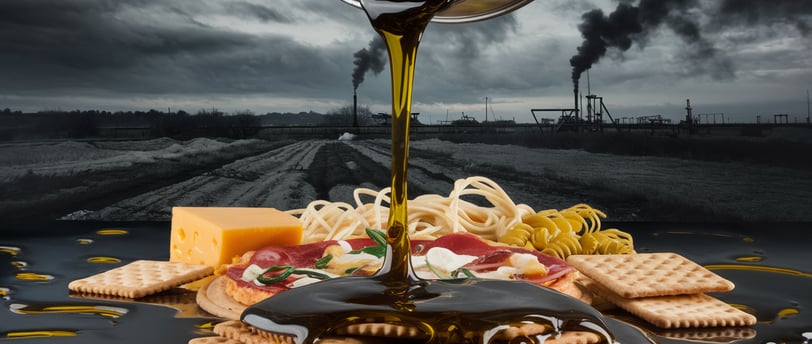Shocking Truth: The Petroleum Ingredients Hiding in Your Everyday Foods
Did you know that petroleum isn't just for fueling cars? It’s also hiding in your food! 🚨 From artificial dyes to preservatives, find out how these petroleum-based ingredients are sneaking into your favorite snacks and the risks they pose to your health. Learn how to spot and avoid them with our latest guide. 🛑🛢️ #HealthAwareness #CleanEating #PetroleumInFood #FoodSafety #Healthatize
INGREDIENTSHEALTH AT A GLANCEEXTENSION FEATURES
Healthatize
11/10/20242 min read


Have you ever imagined that some of the chemicals used to fuel cars or make plastic might also be lurking in your favorite snacks? Brace yourself, because it turns out that petroleum-based ingredients have made their way into our food supply. It’s not just an urban legend—these ingredients are real, and they’re hiding in plain sight. The worst part? You probably eat them every day without even knowing it.
What Are Petroleum-Based Ingredients Doing in Food?
When we think of petroleum, our minds leap to gas stations, crude oil, or perhaps the heavy industry. But incredibly, petroleum-derived substances are also used in food processing. These chemicals serve various purposes, from food coloring to preservatives. Sounds bizarre, right? Let’s dig into some examples and see just how these chemicals sneak into our meals.
1. Artificial Food Dyes
Those bright colors in your favorite candy or fruity cereal often come from petroleum. Yes, those beautiful reds, blues, and yellows are derived from petroleum sources. Ingredients like Yellow 5, Yellow 6, and Red 40 are synthesized from crude oil derivatives. These dyes make your snacks more appealing but come with some serious health concerns—linked to hyperactivity in children and potential carcinogenic effects.
2. TBHQ – The Sneaky Preservative
Tertiary butylhydroquinone (TBHQ) is a preservative that stops oils from going rancid, keeping snacks like crackers and microwave popcorn fresher for longer. But TBHQ is also derived from petroleum. Although allowed in small quantities by the FDA, concerns have been raised about its potential effects on human health, with studies suggesting it could lead to vision disturbances and even DNA damage when consumed in large amounts.
3. Propyl Gallate
Propyl gallate is another antioxidant often used to extend the shelf life of processed foods like meats and vegetable oils. Though it might sound harmless, it’s derived from petroleum. Studies have raised alarms about its possible role in increasing the risk of cancer, yet it remains a common ingredient in many of the foods found on our shelves.
List of Petroleum-Based Ingredients to Watch Out For
Yellow 5 (Tartrazine)
Yellow 6 (Sunset Yellow FCF)
Red 40 (Allura Red AC)
TBHQ (Tertiary Butylhydroquinone)
Propyl Gallate
BHA (Butylated Hydroxyanisole)
BHT (Butylated Hydroxytoluene)
Why You Should Be Concerned
The idea of eating petroleum-based ingredients is shocking enough, but what’s more concerning are the potential health risks these substances carry. Many of these additives have been linked to health problems like behavioral issues in children, allergies, and even increased risks of cancer. While food manufacturers argue that these chemicals are safe in small amounts, the long-term impact of consuming them regularly remains uncertain.
How to Avoid Petroleum in Your Diet
It’s not all doom and gloom—being informed is the first step in making healthier choices. The Healthatize browser extension can help by displaying warnings when these petroleum-based chemicals are present in the foods you browse, making it easier to identify and avoid them. Start by reading labels carefully. Look out for artificial colors (like Red 40 or Yellow 5), TBHQ, and other preservatives that may be derived from petroleum. Opt for organic or minimally processed foods where possible, and remember that the fewer ingredients a product has, the better.
The truth about petroleum-based ingredients in food is unsettling, but knowledge is power. By becoming more aware of what’s really in our food, we can make better choices for our health and the health of our loved ones. The next time you reach for that brightly colored snack or preservative-packed treat, take a moment to consider whether it’s worth it.
Your health isn’t something to gamble with—ditch the petroleum and go for something real instead. After all, fuel belongs in your car, not your body.
